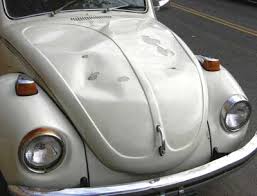Did you know that our sense of smell is one of our most powerful sources of information? We always tend to think of humans as being either visual or tactile creatures, and leave the smelling to the dogs with their amazing noses, but actually our smell is incredibly powerful and has been shown to unlock memories in the brain that other stimuli simply can’t reach.
Evidence that smell counts in buying a car
 And now, it’s been shown to actually put us off buying a used car. No, seriously. A poll of drivers carried out by the AA found that a quarter of all buyers would be put off a purchase because of a bad smell. Now, in fairness, that’s a little less frivolous than it sounds – the smells in question were ‘wet dog’ and ‘child vomit’ which would be enough to put anyone off anything. Even so, they do demonstrate a useful fact – much of a car’s interior is made up of fabric, and that fabric, as anyone who does the laundry at home will realise, absorbs smell. Those smells can tell us much about how a car has been cared for and looked after. A whiff of damp dog simply tells us that a dog has been kept in the car, but the fact that it was wet, and wet often enough to get the smell well and truly into the seat fabric, may mean that the car’s former owner was less than fastidious.
And now, it’s been shown to actually put us off buying a used car. No, seriously. A poll of drivers carried out by the AA found that a quarter of all buyers would be put off a purchase because of a bad smell. Now, in fairness, that’s a little less frivolous than it sounds – the smells in question were ‘wet dog’ and ‘child vomit’ which would be enough to put anyone off anything. Even so, they do demonstrate a useful fact – much of a car’s interior is made up of fabric, and that fabric, as anyone who does the laundry at home will realise, absorbs smell. Those smells can tell us much about how a car has been cared for and looked after. A whiff of damp dog simply tells us that a dog has been kept in the car, but the fact that it was wet, and wet often enough to get the smell well and truly into the seat fabric, may mean that the car’s former owner was less than fastidious.
Likewise, a nasty fug of child vomit is, perhaps somewhat unfairly on hard-working parents, also a sign that a car has possibly come in for a good deal of abuse at some point in its life, and so perhaps we should be wary about buying it.
Service history is seriously important
 More importantly, the same poll showed that more than a third, 38 per cent, of buyers walked away from a possible purchase because of an incomplete, or in some cases entirely absent, service history. Here in Ireland we do still have something of an attitude that ‘it’ll do’ or that ‘the garage around the corner does a grand job’ but the fact is that modern cars are fearsomely complex and, while reliability has unquestionably improved across the board, they do need looking after by a proper expert these days. Buyers are cottoning on to that, so if your car is missing service stamps, or has a simple scrawl in pen from the local grease monkey, you may find yourself struggling to sell it.
More importantly, the same poll showed that more than a third, 38 per cent, of buyers walked away from a possible purchase because of an incomplete, or in some cases entirely absent, service history. Here in Ireland we do still have something of an attitude that ‘it’ll do’ or that ‘the garage around the corner does a grand job’ but the fact is that modern cars are fearsomely complex and, while reliability has unquestionably improved across the board, they do need looking after by a proper expert these days. Buyers are cottoning on to that, so if your car is missing service stamps, or has a simple scrawl in pen from the local grease monkey, you may find yourself struggling to sell it.
Other factors impacting a sale
 The same number of buyers, 38 per cent again, pulled out of a sale because of obvious bodywork damage or scratches. Again, we have often had a curious indifference to keeping a car in pristine order here in Ireland – a sense that a few dents and bumps are just par for the course, but again buyers are becoming more and more fussy, and basically they want their used cars to be (literally) as good as new.
The same number of buyers, 38 per cent again, pulled out of a sale because of obvious bodywork damage or scratches. Again, we have often had a curious indifference to keeping a car in pristine order here in Ireland – a sense that a few dents and bumps are just par for the course, but again buyers are becoming more and more fussy, and basically they want their used cars to be (literally) as good as new.
That’s also reflected in the 31 per cent who decided not to buy on the basis that a car ‘didn’t feel right’ on a test drive. Now, that can be down to a huge number of variables from the condition of the road to the expectations (realistic of otherwise) of the buyer, but what it mostly comes down to, again, is maintenance and care. Tired tyres, worn dampers, unattended service items, a slipping clutch – all of these things can spoil a test drive and cost you a sale. And that’s without even mentioning the 13 per cent who withdrew from a purchase because they weren’t even allowed a test drive at all. You really have to wonder at some people, don’t you…
Age matters
Oddly, there seems to be something of a generation gap in all of this. Those aged over 65 were the most likely to be prepared to buy a car that is in less than totally brilliant condition – possibly a generational thing whereby they never owned a shiny, new car when younger so don’t expect to get one now. 18-24 year olds though are far fussier, and are the least likely to buy something that’s not immaculate.
So what to do
 So, what can you, as a seller of a second hand car, do when selling a used car to increase your chances of making that sale? Well, it’s pretty simple but not entirely easy. As the old saying goes, selling starts on the day you buy – if you look after your car, keep it serviced and clean, care for it properly, then it will be in far better condition, and more likely to entice someone to part with cash for it, on the day you sell.
So, what can you, as a seller of a second hand car, do when selling a used car to increase your chances of making that sale? Well, it’s pretty simple but not entirely easy. As the old saying goes, selling starts on the day you buy – if you look after your car, keep it serviced and clean, care for it properly, then it will be in far better condition, and more likely to entice someone to part with cash for it, on the day you sell.
There’s more you can do – such as ensuring that all paperwork from service history to tax and registration documents is easily to hand, and you could even get your own car history checked with Motorcheck, which would be a nice, confidence-boosting piece of paper to show to a potential buyer.
Just make sure that, if the kids or the dogs have been in the back that you get it valeted too, eh?